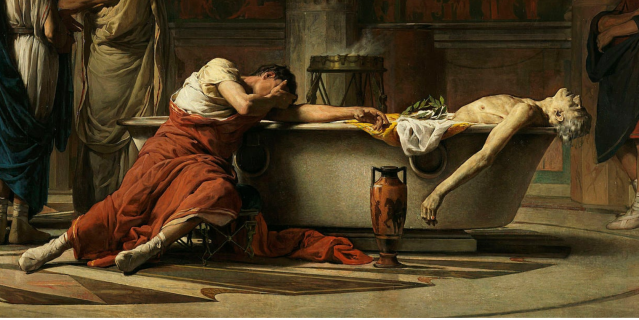Motivation
Why Conventional Success Won’t Make You Happy
The Stoic Seneca on fame and fortune.
Updated June 29, 2024 Reviewed by Lybi Ma
Key points
- Seneca distinguished between ambition and achievement, and warned against ambition.
- Ambition is not just bad for us, it's bad for everyone.
- Paradoxically, it might be our ambitions that are holding us back.

To be ambitious is to seek out achievement not for the sake of achievement itself, which is to be high reaching, but for the sake of distinguishing ourselves from others. Were we the last person on earth, it would make little sense to be ambitious. In the words of the Roman Stoic Seneca, “Ambition, luxury, and caprice need a stage; you will cure them if you keep them from being viewed.”
The dangers of ambition are threefold. First, we should be wary of what we wish for. In one of his letters, Seneca tells Lucilius: “In ordinary speech, we often say that we are overjoyed that one person was elected consul, or that another was married or his wife has given birth, events which, far from being causes of joy, are frequently the beginnings of future sorrow.” In general, the less we have, the freer, and richer, we are.
Second, ambition is future-focused; to live with ambition is to live in fear and anxiety while discounting the moment that is before us. Because ambition ties us to externals [things that are beyond our control], and, ultimately, to other people, it leaves us subject (and vulnerable) to them. As Seneca tells Lucilius, “Liberty does not come for free. If you value it highly, you must devalue everything else.”
Third, ambition is often destructive. Great leaders like Caesar, Pompey, and Marius who are driven by ambition are not even in control of themselves, and, as a result, end up doing terrible things: Marius led armies, but ambition led Marius. While these men were whirling down on the entire world, they themselves were in a whirl, just like tornadoes, which spin everything around because they themselves are spinning. No one becomes fortunate at the expense of another’s misfortune.
The purpose of work is not to further our own interests, even if it is only a house in the middle of the woods that we seek, but to help others and move humanity forward—which is, in any case, the best way of furthering ourselves. The highest wisdom is perhaps that it is not necessary to be ambitious to be high-reaching, or to feel alive. Indeed, it is often our conventional ambitions that are holding us down—even, that are killing us.
If it is fame that we seek, we will have to adopt the misguided values of the majority: It is by skill in wrongdoing that one cultivates popular acclaim. You must make yourself like them: they will not approve of you unless they recognise you. Although we would be foolish to seek out fame, we might nonetheless fall into it by way of our good works, in which case we should utilise it for the greater good, like Elton John or David Attenborough.
If it is merely wealth that we seek, we would do well to remember that wealth is not the answer to our problems, since there are many wealthy people who nonetheless feel wretched, and sometimes all the more wretched for being wealthy.
We suppose that wealth increases our pleasures, but the greatest pleasures are in any case simple and easy to obtain if only our mind is open to them: eating, sleeping, bathing, seeing a friend, walking in a beautiful garden. If anything, wealth removes us from our pleasures by habituating us to luxury and shifting our focus onto itself: He enjoys riches most who has least need of riches. While he is thinking about its increase, he is forgetting about its use.
Even allowing that wealth does increase our pleasures, pleasure is not the be-all and end-all, but, like wealth, distracts from our higher purpose, which is the work of the mind: Maecenas would have provided a fine example of Roman rhetoric, had he not been weakened, even castrated, by his great wealth.
Just as a horse ought to be judged on its speed rather than its harness, so a man ought to be judged on his mind rather than his property, because it is reason, and not wealth, that is the measure of a man. Many people have wealth in the same way that people are said to have a fever when it is in fact the fever that has hold of us. If our mind is diseased, what does it matter whether our sickbed is made of wood or gold?
Stoics, by virtue of their virtue, are predisposed to wealth, and, even without seeking it—especially without seeking it—may end up being very wealthy. There is no harm in being wealthy and occasionally enjoying wealth, so long as our money smells good and we are not tied to it.
The real value of money is to buy time for the mind; the real value of fame is to disseminate its fruits. Fame and fortune should never be our masters, but only ever our slaves.
Read more in Stoic Stories.
References
Seneca, Letters to Lucilius, Letter 94.
Seneca, Letters to Lucilius, Letter 59.
Seneca, Letters to Lucilius, Letter 104.
Seneca, Letters to Lucilius, Letter 94.
Seneca, Letters to Lucilius, Letter 29.
Seneca, Letters to Lucilius, Letter 14.
Seneca, Letters to Lucilius, Letter 19.
Seneca, Letters to Lucilius, Letter 119.




